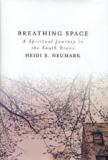A Hard-Knock Ministry
In 1995, in Amazing Grace: The Lives of Children and the Conscience of a Nation, Jonathan Kozol opened a window on the rock-bottom housing, health care and schooling of the Motts Haven enclave in the South Bronx. His focus was on children facing the worst possible odds. His purpose, as declared in the subtitle, was rhetorical: to arouse the public conscience about its scandalous neglect. Kozol’s book was a journalist’s tour, threaded together by conversations with a handful of people, especially Mrs. Alice Washington, fighting ahead through illness, and a bright, perky 13-year-old named Anthony. The center of grace in this world of crack vials and AIDS is an Episcopal priest, “Mother Martha” Overall, of St. Ann’s Church.
In Breathing Space we get a fuller picture of adjacent territory in the South Bronx from an alter-ego of Mother Martha’s, Heidi Neumark, the Lutheran pastor of Transfiguration Church. For two decades, as her pages tell us, she has lived with her Argentinian husband, Gregorio, a few blocks from the church, bringing up two children amid the nightly pop of gunfire and the drug salesmen on the street. She is busy all the while with baptizing, preaching, liturgical decorating, home visiting (“praying on my feet,” she calls it) and burying the dead. In her bicultural ministry to African Americans and Spanish speakers, the seasons—Advent and Christmas, Holy Week and Easter—and the weekly holy Communion take on an urgent if unpredictable life.
This book has a serendipitous pace, as of journal entries fitted together. The author admits her “struggles to find an organizing principle for my own writing.” That does not greatly matter, because of all that is told and said, with economy and color. The reader’s interest does not flag. Halfway through, a principle of structure does emerge, the yearlong throes of a big church-enlargement project called Space for Grace. In spite of downpours into the worship space, broken floor pipes and a calamitous burglary, the costly enterprise comes to completion in Eastertide.
Heidi Neumark does not engage in prettying things up. As she says: “There is no point in romanticizing poverty. It stinks and it kills.” Of her ministry too she admits, “One life is transformed and then another falls apart.”
The author’s indignation breaks out repeatedly, as when she reads in some published report that the South Bronx is “one of the defined ‘border areas’ where rats are permitted to live.” The air is so foul there from garbage and incineration that asthma plagues the residents. Lincoln Hospital hits the nadir of medical incompetence. New Horizons juvenile prison, though an economic windfall for some absentee powers, squelches the hopes of a raft of teenagers. As to schools, “child sacrifice is a daily event,” made the more cruel by school-board officials who squander resources on trips and other perks. The sons of exasperated mothers come and go, beyond control, and the incidents multiply of girls violated by their stepfathers or their mother’s boyfriend.
This should add up to zero, but it does not. “There is tremendous vitality among the instability,” Neumark says. “Life is scrapping and sparring all over the place.” She has many a profile to illustrate this, and none fuller than that of Burnice, whose story is threaded through these pages, like Kozol’s Mrs. Washington. Burnice has hit the depths of addiction and degradation, when a Christmas visit to the church opens her heart. This by no means ends her trials: the apartment is flooded, police tear it to pieces in search of drugs, the heat fails in winter. But Burnice becomes a Bible study leader and pillar of the fragile community.
These battles for redemption take place in a milieu of some strong community organizing, thanks to an ecumenical agency called South Bronx Churches, whose roots are in the Industrial Areas Foundation. Neumark’s training with the S.B.C. enables her to be active in their construction program of new houses, the Nehemiah Housing Trust, and their model secondary school, the Bronx Leadership Academy (whose inauguration I was once privileged to attend). And she credits the S.B.C. with instilling in her the spirit of reflection, which is evinced on every page.
Breathing Space is a beautifully produced book, and it has a utopian poignancy. “The distance between the world as it is and the world as it should be tears at my heart,” the author admits. Yet it is grounded in the virtue of hope. Heidi Neumark professes herself full of the spirit she finds in the Advent liturgy—anhelo, yearning—and she appears constant at prayer, which is her breathing space.
This article also appeared in print, under the headline “A Hard-Knock Ministry,” in the February 16, 2004, issue.








